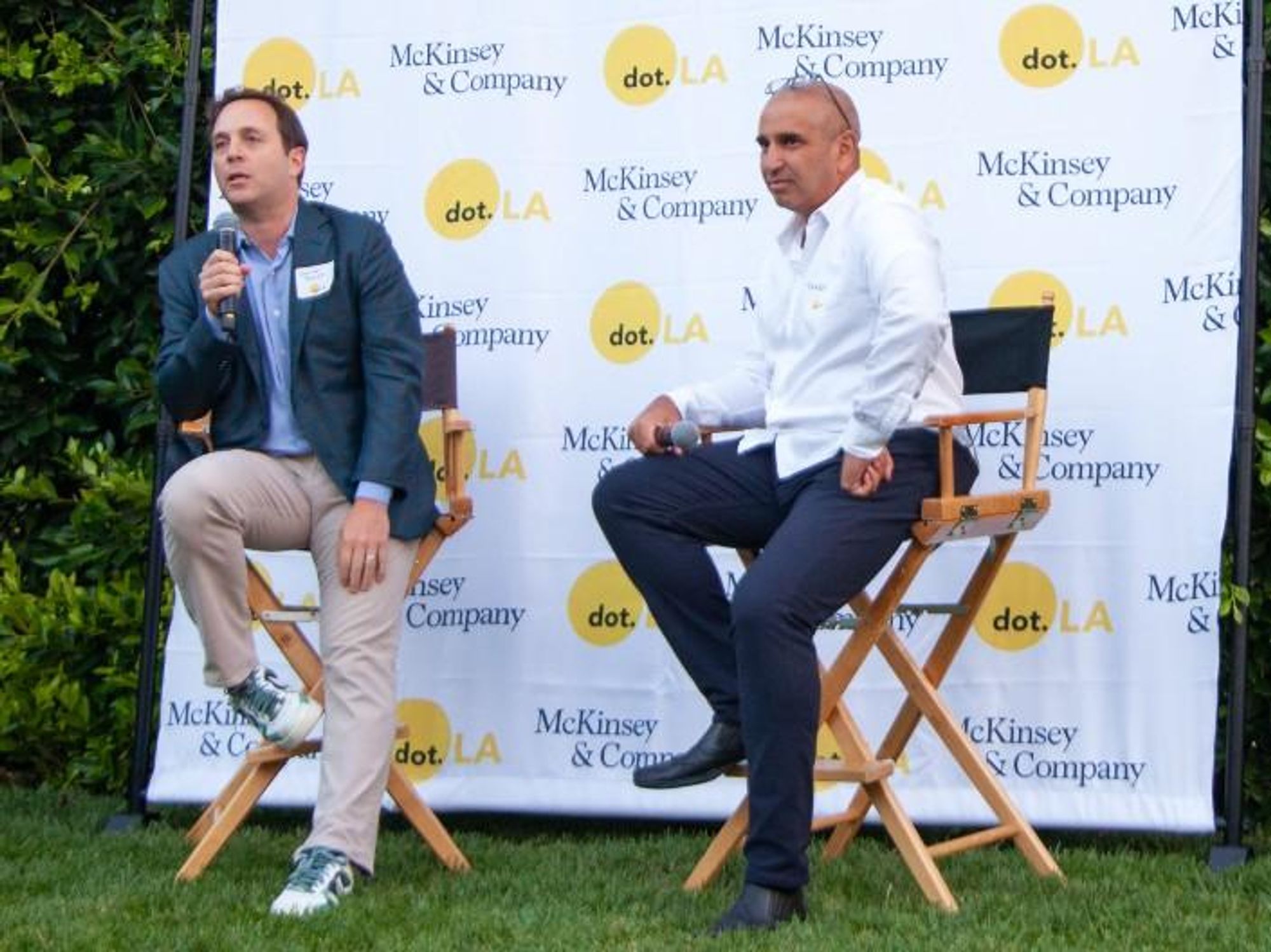'Throw Everything Overboard That You Don’t Really Need': Spencer Rascoff Offers Founders Advice During a Downturn

Lights were strung across the lawn and over the pool while about 150 guests meandered through the open concept home and towards the bar and the mounds of guacamole and warm churros. Hosted by McKinsey and Pacific Western Bank, “The Founder’s Guide to L.A.” event focused on advice from active angel investor, author and podcaster Spencer Rascoff, who co-founded Zillow, Hotwire, Pacaso, Supernova and–of course–dot.LA.
Through questions asked by McKinsey & Company Senior Partner Tarek Elmasry and the audience, Rascoff spent a half hour providing speedy and insightful advice to tech founders in attendance.
When asked what he looked for in a founder, Rascoff said, “I look for grit - somebody who has something to prove to somebody, and who has a chip on their shoulder–someone who’s willing to run through walls for that company and that idea.” Rascoff, who seemed even-keeled and energetic, explained that his ambition and drive came from the death of his brother in a car accident when they were both in their teens.
Though founder life is exciting, Rascoff now sees himself as more of a teacher.
“I did it for twenty-something years, and now I’m a coach and a mentor to my startups. I’m happy to be in my mid-40s and to be at this stage in my career. It’s a little less dangerous. It’s also intellectually stimulating and rewarding.”
He teaches a class on startups at Harvard College and Harvard Business School. No investor is perfect, and Rascoff has had his share of failures along the way, but he’s learned from those as well.
As the evening progressed, Rascoff advised founders to make financial cuts to extend their runway to cover 24 months of operations.
“Cut your headcount, cut marketing expense. Throw everything overboard that you don’t really need in order to extend the runway.” He said it may not be as fun as running a company during the good times, but great things can happen when managing a company through a difficult period.
As for advice for founders who are seeking equity, Rascoff made some grim observations.
“Equity is hard to come by right now. VCs are mostly hiding under their desks; they’re shoring up their existing portfolio companies with inside rounds, and it’s pretty hard to get investors to write new checks into new companies right now.”
An attendee with a background in robotics and aerospace asked Rascoff and Elmasry how to start a company that would be in a capital-intensive area when no one is easily giving money. Both suggested bootstrapping. Before investing, investors want to see more proof points these days–and at a slightly later stage, Rascoff explained.

Market volatility and recession fears have caused the IPO window to slam shut in 2022. Experts have predicted a return in activity in late 2023. But Rascoff thinks it could be even quicker than that, if historical trends repeat themselves. The IPO window has never been closed for much more than eight months, he notes, and the sector is already about six months into its current dry spell.
Whenever access to capital becomes easier to access, L.A. is perfectly positioned to be a major tech hub. Rascoff hailed the region as the place where media, entertainment, pop culture and influencers intersect. Along with consumer businesses, L.A. boasts incredible aerospace and a robust venture ecosystem. Recently, even the major Silicon Valley players have begun to appreciate the value of establishing a presence in L.A., he added.
Rascoff intends to ride these tailwinds. As general partner of venture company 75 & Sunny, he and his team is working with 100 startups and have incubated five companies, a quarter of which are proptech startups. He’s specifically excited about democratizing access to real estate assets, but he’s also focusing on vertical social media networks like All Trails and LinkedIn. With his daughter Sophia, Rascoff recently started a vertical social network aimed at foodies called Recon.
After the talk, the attendees continued the night under the lights, surrounded by lush green walls of foliage, drinking their beverages of choice and talking about tech in L.A. and the future. Despite the current economic struggles, there’s plenty of optimism in the room.
- Former Zillow CEO Spencer Rascoff launches dot.LA, a news site for ... ›
- Office Hours Podcast with Spencer Rascoff - dot.LA ›
- What Spencer Rascoff Looks for in a Founder - dot.LA ›
- Los Angeles' Top Entrepreneurs, as Picked by its VCs - dot.LA ›
- Here's What To Expect At LA Tech Week - dot.LA ›
- SoCal Venture Pipeline Partners with Pacific Western Bank - dot.LA ›
- Generative AI: Tech Startup Savior or Buzzy Nothingburger? - dot.LA ›



 Image Source: Skyryse
Image Source: Skyryse
 Image Source: Northwood Space
Image Source: Northwood Space